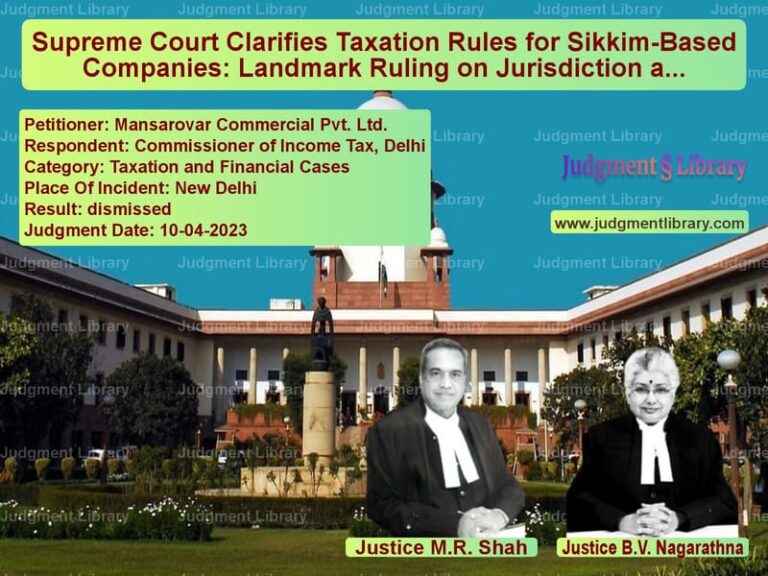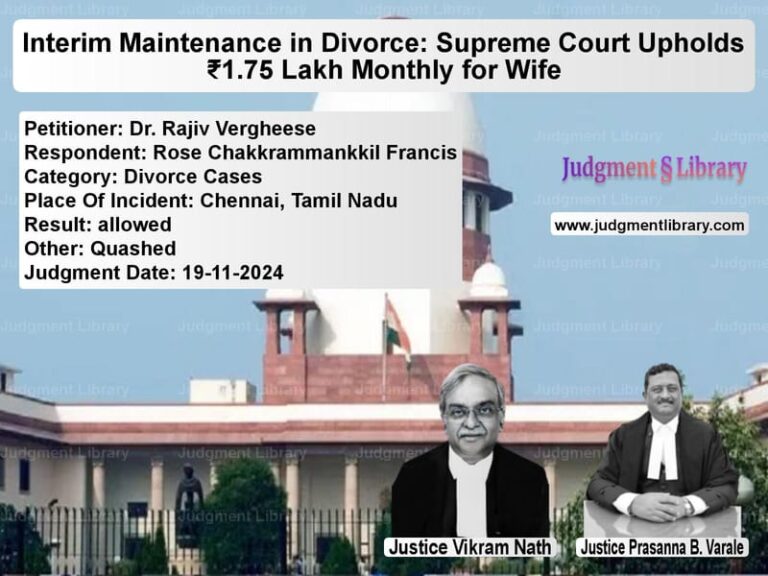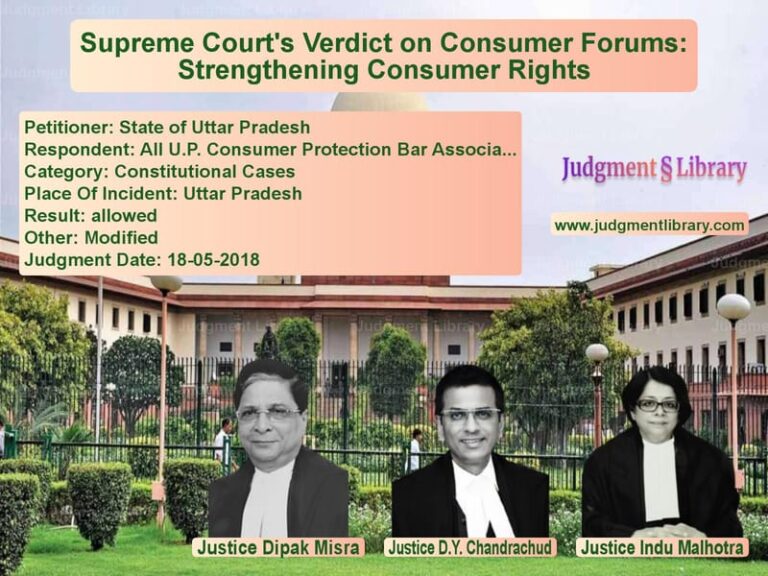Supreme Court Grants Permanent Commission to Female Officer: Landmark Ruling on Age Relaxation and Equal Treatment
The Supreme Court of India recently delivered a significant judgment on December 9, 2024, in the case of Lt. Col. Suprita Chandel vs. Union of India and Ors., addressing critical issues related to the grant of permanent commission to women officers in the Indian Army. The Court directed the Union of India to grant permanent commission to Lt. Col. Suprita Chandel and extend the benefits of seniority, promotion, and monetary compensation. This case is a landmark ruling in ensuring equal treatment of women officers in the Indian Armed Forces.
Background of the Case
Lt. Col. Suprita Chandel, a Short Service Commissioned (SSC) officer in the Army Dental Corps (AD Corps), joined the Indian Army on March 10, 2008. The appellant was denied the opportunity to apply for a permanent commission after her third attempt at the departmental examination, due to a policy amendment in 2013 that restricted age limits and did not provide relaxation to women officers in the same way it did to their male counterparts.
The appellant was initially eligible for the third chance at the departmental examination for permanent commission, which was available to SSC officers based on age and service tenure. However, after the amendment to the policy, the appellant became ineligible to avail of her third chance, and her request for relief was denied by the Armed Forces Tribunal (AFT), Regional Bench, Lucknow in January 2022. The appellant sought parity with similarly situated officers and relief based on the earlier judgment of the AFT, Principal Bench, which had granted one-time age relaxation to other similarly situated officers.
Legal Issues Raised
- Whether the appellant, being similarly situated to other officers who had been granted one-time age relaxation, is entitled to the same benefits.
- Whether the appellant’s case of denial of permanent commission is discriminatory in nature.
- Whether the policy amendment in 2013 unfairly excluded certain officers from consideration for permanent commission.
Arguments Presented
Arguments by the Appellant
- The appellant argued that she was unfairly denied the opportunity to apply for permanent commission due to a change in the policy, which was implemented after her initial eligibility.
- The appellant contended that the denial of the third chance was arbitrary, as similarly situated male officers had received relaxation in the age limit for permanent commission.
- The appellant further argued that she was entitled to parity with other officers who had received the benefits of permanent commission following the AFT’s Principal Bench ruling.
- Additionally, the appellant sought permanent commission and the associated benefits, including seniority and monetary compensation, as per the AFT’s earlier ruling for similarly situated officers.
Arguments by the Respondent (Union of India)
- The respondents argued that the amendments to the policy were in line with the evolving structure of the Indian Armed Forces, and the appellant’s case did not qualify for any special treatment.
- The respondents also cited the case of similarly situated officers who were given permanent commission after challenging the amendment, stating that the appellant could not rely on their case as it involved a different factual matrix.
- The respondents claimed that granting the appellant permanent commission would set a problematic precedent for all future cases and disrupt the established policy framework.
- The respondents further argued that while age relaxation was granted to certain officers, it was not an obligation of the government to extend the same benefits to everyone.
Supreme Court’s Observations
On Equality and Non-Discrimination
The Supreme Court emphasized the importance of equality and non-discrimination, especially in the context of gender, in the armed forces. The Court referred to K.I. Shephard v. Union of India (1987), stating that when a citizen is aggrieved by government actions, and a declaration of law in favor of one group has been made, others similarly situated should be granted the same benefit:
“Where a citizen obtains a declaration of law in their favor, other similarly situated persons are entitled to the same benefit without the need for them to go to court.”
On the Effect of Policy Amendments
The Court acknowledged that while the policy amendment of 2013 introduced stricter age limits for permanent commission eligibility, the appellant had been denied the chance to apply due to circumstances beyond her control. The Court noted:
“The policy amendment in 2013 inadvertently affected officers like the appellant, who were initially eligible but lost their opportunity due to the revised age limits. This was an inequitable result, and the principle of fairness demands that she be granted the same consideration as others who were similarly situated.”
On the Discretionary Power of the Court under Article 142
The Court referred to its powers under Article 142 of the Constitution to do complete justice, stating that:
“In matters of extreme unfairness, this Court must not hesitate to use its extraordinary powers under Article 142 to ensure fairness and justice, particularly when no fault lies with the appellant.”
Furthermore, the Court pointed out the appellant’s distinguished record and service, including being granted a commendation card by the Chief of Army Staff. It held:
“It is unjust to deprive the appellant, who has rendered valuable service to the nation, of a permanent commission due to procedural flaws in the policy.”
Final Verdict
- The Supreme Court allowed the appeal, granting permanent commission to the appellant with all consequential benefits.
- The Court directed the Union of India to extend the benefit of permanent commission with effect from the same date as those similarly situated officers who benefited from the earlier AFT ruling.
- The Court further directed that the appellant be granted all consequential benefits, including seniority, promotion, and monetary compensation, within four weeks of the judgment.
- The Court quashed the order of the AFT, Regional Bench, Lucknow, dated January 5, 2022, that had dismissed the appellant’s claim.
Implications of the Judgment
- Gender Equality in Armed Forces: This ruling strengthens the principle of gender equality in the Indian Armed Forces, ensuring that women officers are given the same treatment as their male counterparts.
- Policy Amendments: The judgment serves as a reminder to the government and armed forces to carefully consider the impact of policy amendments on officers who are affected by such changes.
- Use of Article 142: The judgment demonstrates how the Supreme Court can use its powers under Article 142 of the Constitution to rectify inequities in government policies and ensure justice for individuals who have been unfairly treated.
- Promotion of Women in Armed Forces: This ruling also serves to promote the empowerment of women officers in the armed forces and ensures that they have equal opportunities for career advancement.
The Supreme Court’s decision in this case serves as an important step towards ensuring fair treatment for women in the Indian Armed Forces, addressing the challenges they face due to procedural lapses and policy changes.
Petitioner Name: Lt. Col. Suprita Chandel.Respondent Name: Union of India and Others.Judgment By: Justice K.V. Viswanathan, Justice B.R. Gavai.Place Of Incident: Lucknow, Uttar Pradesh.Judgment Date: 08-12-2024.
Don’t miss out on the full details! Download the complete judgment in PDF format below and gain valuable insights instantly!
Download Judgment: lt.-col.-suprita-cha-vs-union-of-india-and-o-supreme-court-of-india-judgment-dated-08-12-2024.pdf
Directly Download Judgment: Directly download this Judgment
See all petitions in Employment Disputes
See all petitions in Workplace Harassment
See all petitions in Public Sector Employees
See all petitions in Judgment by K.V. Viswanathan
See all petitions in Judgment by B R Gavai
See all petitions in allowed
See all petitions in Quashed
See all petitions in supreme court of India judgments December 2024
See all petitions in 2024 judgments
See all posts in Service Matters Category
See all allowed petitions in Service Matters Category
See all Dismissed petitions in Service Matters Category
See all partially allowed petitions in Service Matters Category







